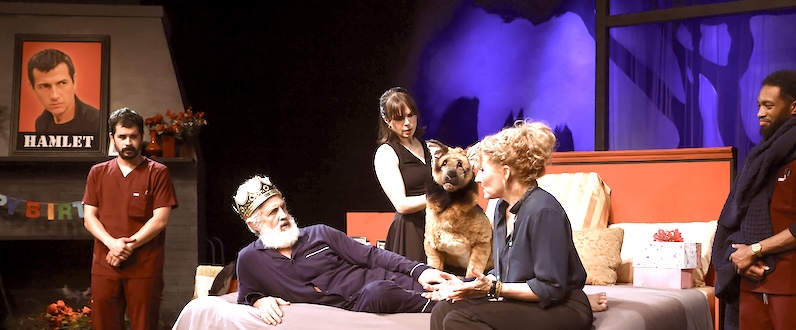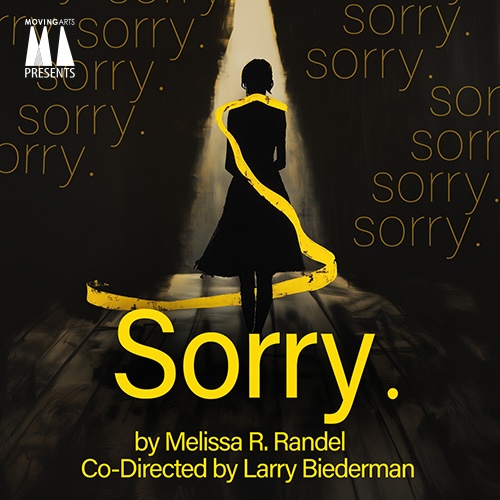Andres Velez, Jack Stehlin, Emily Yetter, Jade Sealey and Ahkei Togun
(Photo by John Dlugolecki Photography)
Reviewed by Deborah Klugman
The Odyssey Theatre
Through July 8
RECOMMENDED
From the moment he makes his entrance — sour-faced, cantankerous, shuffling as he leans resentfully on the walker that testifies to infirmity and old age, a comedic Jack Stehlin ignites the stage.
In character — an aging thespian whose selfish narcissism reflects his commonality with the Bard’s Lear — he casts a dismissive glance at a large poster to his right, one that features him, perhaps 40 or 50 years prior, as an intense and charismatic Hamlet. Making his way to the large bed at the focal point of the eye-catching, versatile set (Mark Guirguis), he proceeds to engage in a series of clownish shenanigans, his purpose (achieved!) to startle and fool the audience. That presence — of a weirdly twisted but charismatic clown — reflects the tenor of Lear Redux — adapter/director John Farmanesh-Bocca’s wildly idiosyncratic take on [one of] Shakespeare’s most towering works.
To savor the piece, it’s best to pull back on any effort to track similarities between what happens in this story and the events of the original — and simply go with the flow. Plot and character components have been plucked and scrambled. Stehlin’s Lear/The Actor has two daughters named Goneril (Jade Sealey) and Regan (Eve Danzeisen); his third daughter (we learn from a 60 Minutes segment on this actor, part of a hilarious fake video montage) died tragically young, and has been replaced by a dog (a puppet controlled by the adept and agile puppeteer Emily Yetter, who proves an expressive performer as well). Following his youngest daughter’s death, Lear/the Actor has named the dog Cordelia, and treats this animal as if it were his child.
The half-brothers in Shakespeare’s story — the villainous Edmund (Andres Velez) and the virtuous Edgar (Ahkei Togun) — here double as in-home nurses for the ailing man and have their own stuff going on. They also appear later as a couple of conversant homeless guys who try to assist The Actor after he’s fled his domicile. The Actor has a brother, who is also designated as Kent (Dennis Gersten), and when the infuriated daughters talk about institutionalizing their infuriating father, who purposely and gleefully provokes them, he’s the one who comes to his defense. Later, in a semblance of the storm scene, Gersten reappears, this time as a wisdom-dispensing homeless person-slash-blind Gloucester, to deliver one of the play’s core messages — how bogus it is that our notion of time be a linear construct, in contrast to the reality of a cosmic ever-present now.
Other threads drawn, then contemporized, from the original plot include a rivalry between Goneril and Regan for the lustful attentions of caretaker Edmond, whose villainy extends to undermining his compassionate colleague by spreading the notion that he’s a thief. But it’s unclear if this is real (at least it was unclear to me), since many of the scenes seem to take place in the mind of the dementia-ridden Actor, one clue being a shift in lighting to blue or reddish underworld hues (lighting by Bosco Flanagan).
As to language, there are famous passages and quotes from Shakespeare, but not always from Lear; we also get Mark Anthony’s monologue from Julius Caesar and the famous “Tomorrow and tomorrow” declamation from Macbeth. Much of the dialogue is contemporary American. And the tonal absurdity of it all — the “all” being human existence — is underscored with piped-in music, in particular for me, a recording of “Mr. Sandman” played near the top. Ostensibly about a gal yearning for the man of her dreams, the song has darker overtones, gleaned from the folkloric origins of the Sandman as a harbinger of death.
What matters most as you take in this adaptation (subtitled “A Tragic Fantasia”) are the themes it shares with its source. Front and center is the child-parent relationship, or more specifically child-rearing by a spoiled and self-obsessed person (though Goneril and Regan are no prizes for anyone either). In Lear Redux, the conflict has been transmuted from a distant, fabled past to Hollywood, where the two sisters rage at a dad who has always preferred indulging the adoration of a fawning public to establishing a relationship with his kids. Meanwhile, if it’s not already clear that the Actor is in bad shape, words scrolled on the footboard of the bed for all to see drop a hint, “The actor will die tonight.”
While Stehlin, with his fire-crackling physicality and glowering stares, bestrides the production, other performances help lock in the irony and humor — Velez as the duplicitous nurse/Edmund and Togun as his compassionate antithesis play well in their various roles. Sealey and Danzeisen as the frustrated daughters ground the story in the real world as most of us perceive it. Gersten’s captivating moment is as the blind Gloucester. Yetter, more than a puppeteer, independently reacts to the blandishments and tantrums of Lear/The Actor, coming to assume by the end the role of the scorned yet forgiving Cordelia. It’s a subtly beguiling performance.
On opening night, some of the pacing could be a tad sharper and the choreographed movement a mite crisper, but these elements will likely gel after another performance or two.
Costuming by Denise Blasor includes a silvery and silly-looking crown that the spoiled-rotten lead character dons to flaunt his self-importance in the face of those around him. The old guy is crazy-making, laughable and pathetic. Meanwhile, the poster of his youthful self looms prominent in the room, a reminder of his mortality and his decay.
Odyssey Theater, 2055 S. Sepulveda Blvd., West LA. Fri.-Sat., 8 pm, Sun., 7 pm, Wed., June 11 and June 25, 8 pm, dark July 4; thru July 8. OdysseyTheatre.com https://odysseytheatre.com/Running time: approximately 90 minutes with no intermission.




















